【新课标】Unit 6 Do you like bananas Section A (Grammar Foucus—3c)课件(32张PPT)
文档属性
| 名称 | 【新课标】Unit 6 Do you like bananas Section A (Grammar Foucus—3c)课件(32张PPT) |  | |
| 格式 | zip | ||
| 文件大小 | 3.3MB | ||
| 资源类型 | 试卷 | ||
| 版本资源 | 人教新目标(Go for it)版 | ||
| 科目 | 英语 | ||
| 更新时间 | 2022-11-13 09:40:23 | ||
图片预览

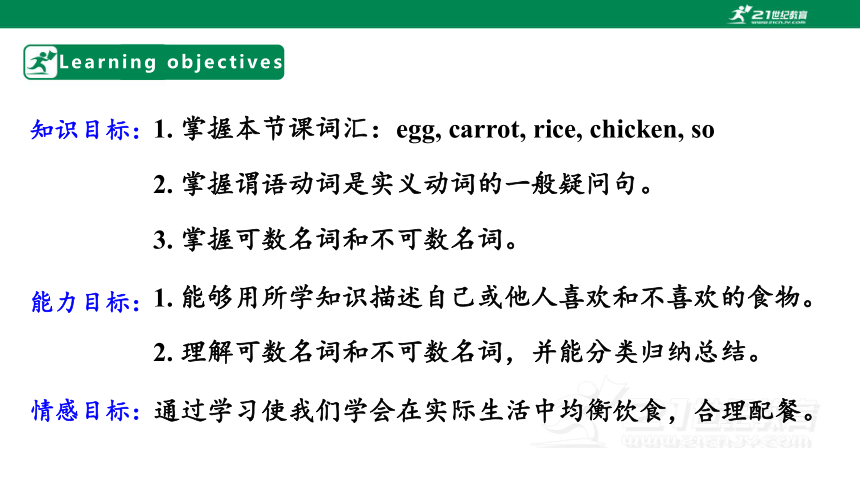
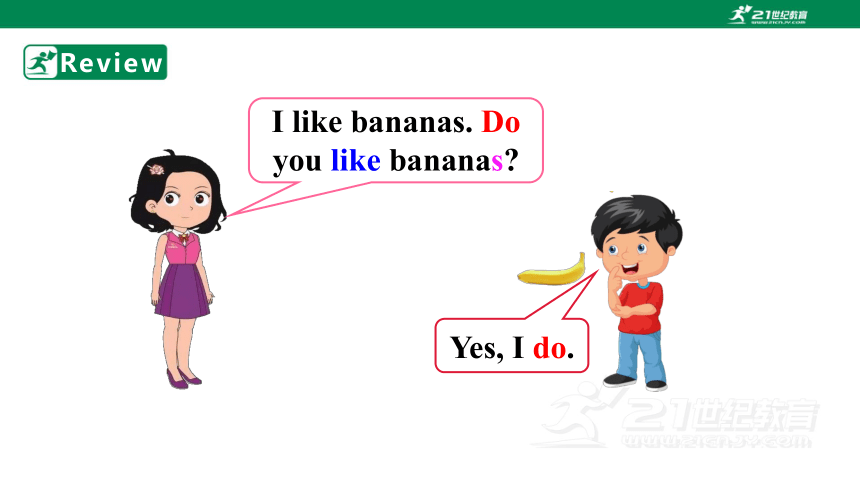
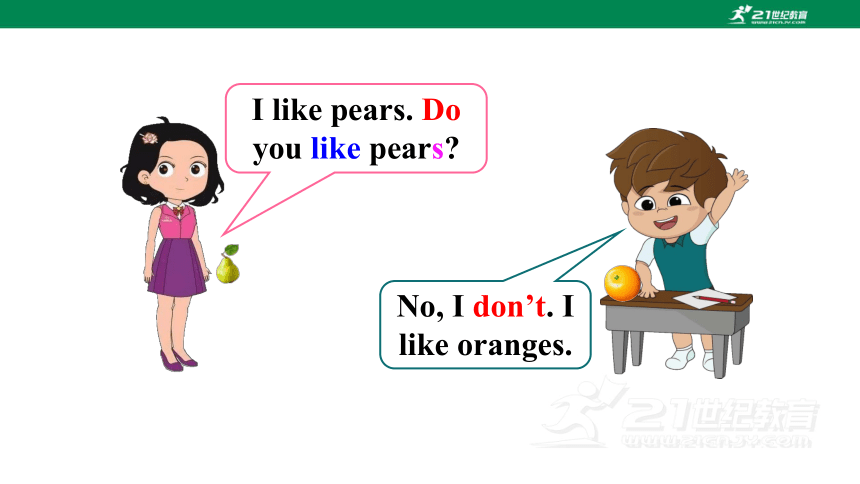
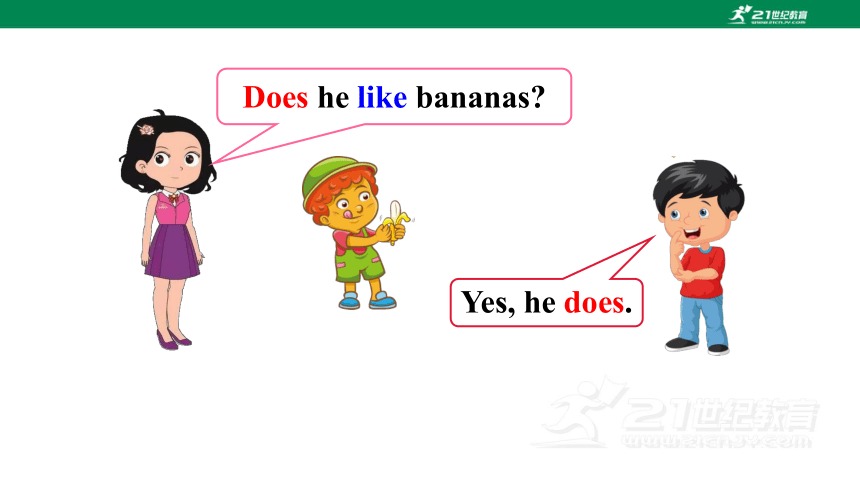
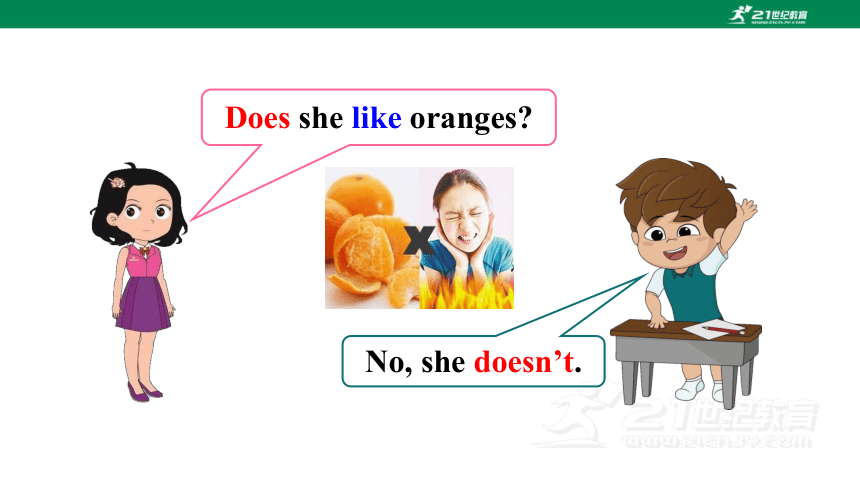
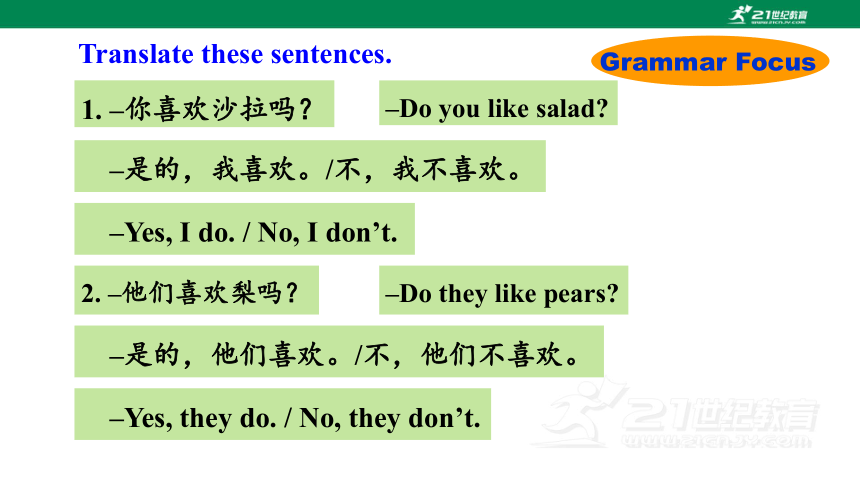
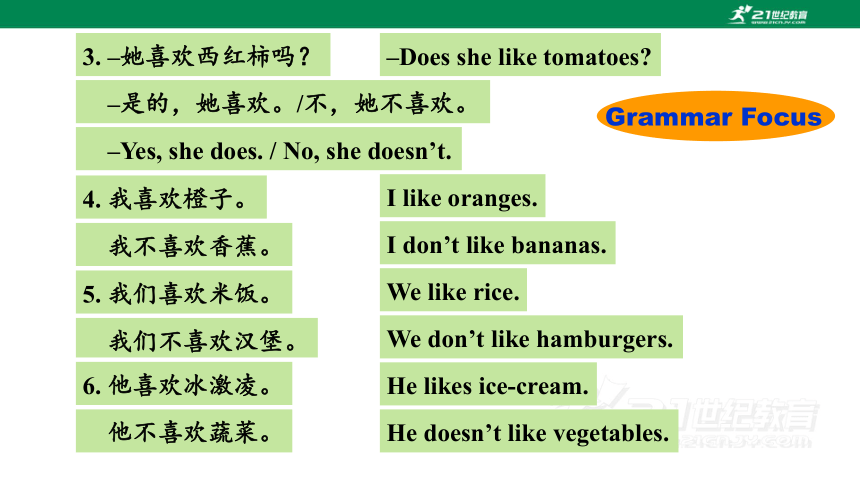
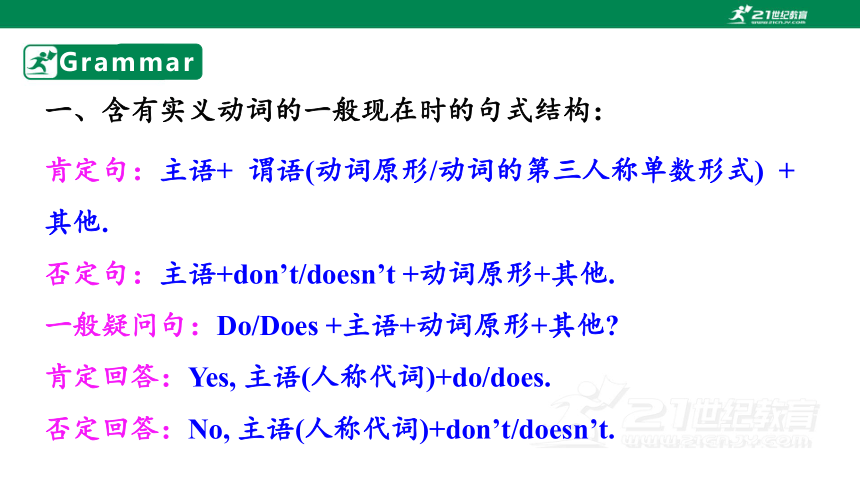
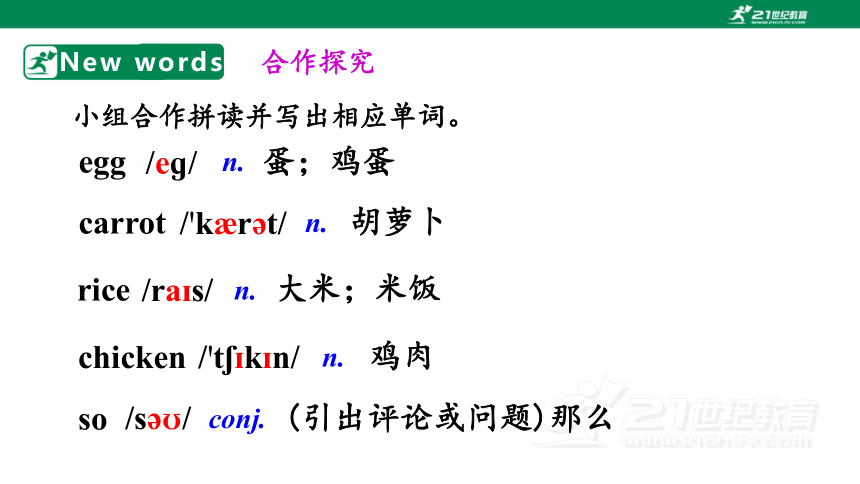
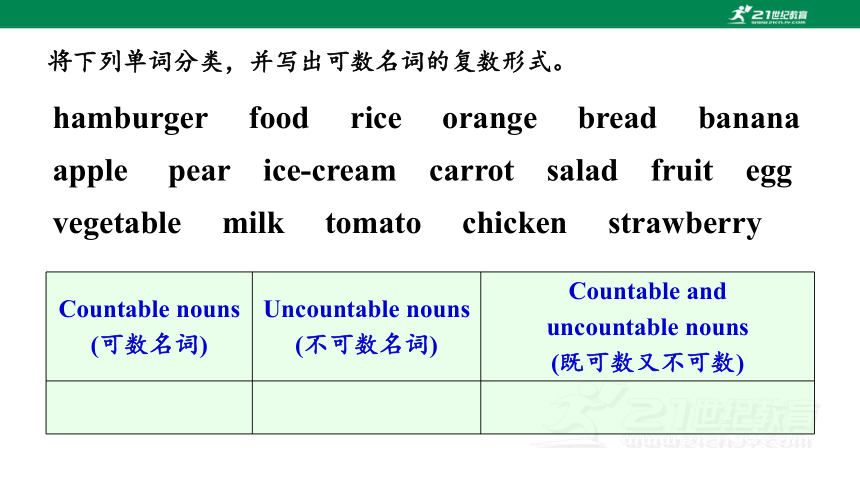
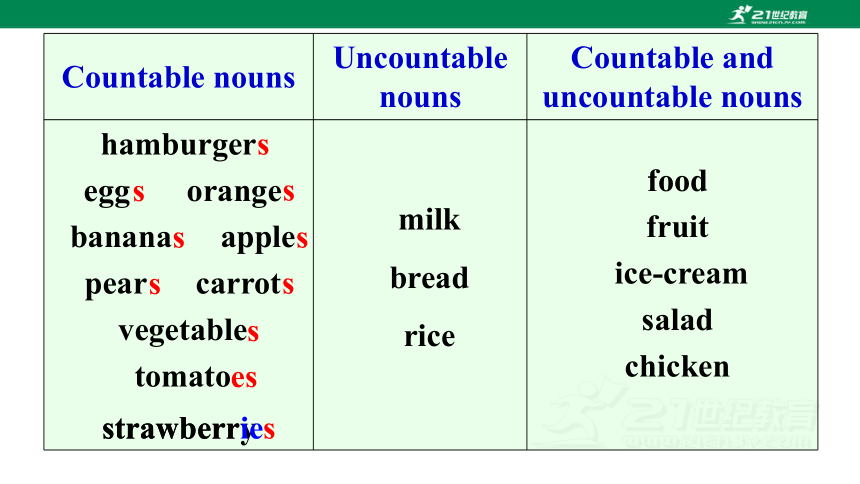
文档简介
(共34张PPT)
人教新目标(Go for it)版
七年级上册
Unit 6 Do you like bananas
Section A
(Grammar Foucus-3c)
Learning objectives
知识目标:
1. 掌握本节课词汇:egg, carrot, rice, chicken, so
2. 掌握谓语动词是实义动词的一般疑问句。
能力目标:
情感目标:
1. 能够用所学知识描述自己或他人喜欢和不喜欢的食物。
通过学习使我们学会在实际生活中均衡饮食,合理配餐。
3. 掌握可数名词和不可数名词。
2. 理解可数名词和不可数名词,并能分类归纳总结。
Review
Yes, I do.
I like bananas. Do you like bananas
I like pears. Do you like pears
No, I don’t. I like oranges.
Yes, he does.
Does he like bananas
Does she like oranges
No, she doesn’t.
1. 你喜欢沙拉吗?
Do you like salad
是的,我喜欢。/不,我不喜欢。
Yes, I do. / No, I don’t.
2. 他们喜欢梨吗?
Do they like pears
Translate these sentences.
是的,他们喜欢。/不,他们不喜欢。
Yes, they do. / No, they don’t.
Grammar Focus
3. 她喜欢西红柿吗?
Does she like tomatoes
4. 我喜欢橙子。
I like oranges.
5. 我们喜欢米饭。
We like rice.
是的,她喜欢。/不,她不喜欢。
Yes, she does. / No, she doesn’t.
我不喜欢香蕉。
I don’t like bananas.
我们不喜欢汉堡。
We don’t like hamburgers.
6. 他喜欢冰激凌。
He likes ice-cream.
他不喜欢蔬菜。
He doesn’t like vegetables.
Grammar Focus
Grammar
一、含有实义动词的一般现在时的句式结构:
肯定句:主语+ 谓语(动词原形/动词的第三人称单数形式) + 其他.
否定句:主语+don’t/doesn’t +动词原形+其他.
一般疑问句:Do/Does +主语+动词原形+其他
肯定回答:Yes, 主语(人称代词)+do/does.
否定回答:No, 主语(人称代词)+don’t/doesn’t.
New words
合作探究
小组合作拼读并写出相应单词。
chicken
n.
鸡肉
so
conj.
(引出评论或问题)那么
/ t k n/
/s /
rice
n.
大米;米饭
/ra s/
carrot
n.
胡萝卜
/ k r t/
egg
n.
蛋;鸡蛋
/eɡ/
Countable nouns (可数名词) Uncountable nouns (不可数名词) Countable and
uncountable nouns
(既可数又不可数)
hamburger food rice orange bread banana
apple pear ice-cream carrot salad fruit egg
vegetable milk tomato chicken strawberry
将下列单词分类,并写出可数名词的复数形式。
Countable nouns Uncountable nouns Countable and uncountable nouns
hamburger egg orange banana apple pear carrot vegetable tomato
s
s
s
s
s
s
s
s
es
strawberry
strawberries
milk
bread
rice
food
fruit
ice-cream
salad
chicken
Grammar
二、可数名词与不可数名词
1. 可数名词与不可数名词的含义及特点:
含 义 特 点
可数 名词 指可以用来计数的名词,它有单数和复数两种形式。 可以用a, an或具体的数词修饰。
如:
a tomato 一个西红柿
an egg 一个鸡蛋
two pears 两个梨
含 义 特 点
不可数 名词 指不可以直接计数的名词,它只有单数形式。 不可以与a, an或数词连用,要表示数量的多少时,其前可以加some,any或表数量的短语。如:
some bread 一些面包
a cup of milk 一杯牛奶
特 点
既是可 数名词 又是不 可数名词 有些词,既可用作可数名词,也可以用作不可数名词,但意义却不同。如:
可数名词 不可数名词
chicken 小鸡 鸡肉
food 各种食物 食物
glass 玻璃杯;眼镜 玻璃
2. 可数名词单数变复数的规则:
(1) 一般直接加 s。
book → books cat → cats
(2) 以s, x, sh, ch结尾的加 es。
bus → buses box → boxes
brush → brushes (刷子)
watch → watches
(3) 以“辅音字母+y”结尾,变y为i,再加 es。
family → families
strawberry → strawberries
(4) 以字母“o”结尾的,有生命的词,加 es;
以字母“o”结尾的,无生命的词,加 s。
tomato → tomatoes
photo → photos
(5) 部分以f(e)结尾的词,变f(e)为v,再加-es。
knife → knives leaf → leaves
助记口诀:
妻子 (wife) 持刀 (kinfe) 去宰狼 (wolf),
小偷 (thief) 吓得发了慌。
躲在架 (shelf) 后保己 (self) 命 (life),
半 (half) 片树叶 (leaf) 遮目光。
如: man → men woman → women
child → children sheep → sheep
foot → feet tooth → teeth
mouse → mice Chinese → Chinese 等。
(6) 少数可数名词变复数是不规则的
(7) 注意以下特殊情况:
① 单复数同形
Chinese → Chinese Japanese → Japanese
sheep → sheep deer → deer
② 不规则变化
foot → feet man → men mouse → mice
woman → women child → children
③ 有些名词常用复数形式
clothes trouses pants shoes
scissors glasses gloves
④ 有些名词常用单数形式表示复数概念
police (警察) family (家人) class (同学们)
1. I like fruit, but I (don’t/doesn’t) like vegetables.
2. She (like/likes) bread, but she (doesn’t/don’t) like salad.
3. He (like/likes) bananas, but he (don’t/doesn’t) like oranges.
4. We (likes/like) hamburgers, but we don’t (like/likes)
chicken.
5. They (likes/like) pears, but they (don’t/doesn’t) like
strawberries.
3a
Underline the correct words in the brackets.
3b
Number these sentences[1-4]to make a conversation.
So, let’s get salad. Yes, I do.
Do you like salad OK.
1
2
3
4
Survey
3c
Ask your classmates about the food in the chart. Find out what they like and don’t like.
Food
Likes Liu Li
Doesn’t like Zhao Jun
ice-cream
“Do you like… ”
Do you like ice cream
No, I don’t
Do you like hamburger
Yes, I do.
In my class, Liu Li likes ice-cream, but Zhao Hui doesn’t like it. ... and ... like .... ... and ... don’t like ....
Report:
Summary
Important words:
egg, carrot, rice, chicken, so
Important phrase:
ask sb. about sth.
Section A (Grammar Focus-3c)
Important sentences:
1. I like fruit, but I don’t like vegetables.
2. He likes bananas, but he doesn’t like oranges.
Exercise
Ⅰ. 用括号内所给词的适当形式填空。
1. There is some ______ (rice) in the bowl.
2. She doesn’t like the _______ (chicken) on the plate.
3. Here are some _____________ (strawberry) in the basket.
4. My brother ____________ (not like) oranges.
5. Does Mike like ________ (tomato)
6. He _____ bread but he doesn’t _____ salad. (like)
rice
chicken
doesn’t like
tomatoes
strawberries
likes
like
1. Look! Some bread in the bag and some apples___ on
the table.
A. is; is B. is; are C. are; is D. are; are
2. These are burgers.
A. Linda B. Linda’s C. John D. Tom
3. My grandmother .
A. like apple B. like apples C. likes apple D. likes apples
B
B
D
Ⅱ. 单项选择。
Homework
见配套练习册
Radish and ginger
keep away from doctor.
冬吃萝卜夏吃姜,不劳医生开药方。
与君共勉
谢谢
21世纪教育网(www.21cnjy.com)
中小学教育资源网站
兼职招聘:
https://www.21cnjy.com/recruitment/home/admin
人教新目标(Go for it)版
七年级上册
Unit 6 Do you like bananas
Section A
(Grammar Foucus-3c)
Learning objectives
知识目标:
1. 掌握本节课词汇:egg, carrot, rice, chicken, so
2. 掌握谓语动词是实义动词的一般疑问句。
能力目标:
情感目标:
1. 能够用所学知识描述自己或他人喜欢和不喜欢的食物。
通过学习使我们学会在实际生活中均衡饮食,合理配餐。
3. 掌握可数名词和不可数名词。
2. 理解可数名词和不可数名词,并能分类归纳总结。
Review
Yes, I do.
I like bananas. Do you like bananas
I like pears. Do you like pears
No, I don’t. I like oranges.
Yes, he does.
Does he like bananas
Does she like oranges
No, she doesn’t.
1. 你喜欢沙拉吗?
Do you like salad
是的,我喜欢。/不,我不喜欢。
Yes, I do. / No, I don’t.
2. 他们喜欢梨吗?
Do they like pears
Translate these sentences.
是的,他们喜欢。/不,他们不喜欢。
Yes, they do. / No, they don’t.
Grammar Focus
3. 她喜欢西红柿吗?
Does she like tomatoes
4. 我喜欢橙子。
I like oranges.
5. 我们喜欢米饭。
We like rice.
是的,她喜欢。/不,她不喜欢。
Yes, she does. / No, she doesn’t.
我不喜欢香蕉。
I don’t like bananas.
我们不喜欢汉堡。
We don’t like hamburgers.
6. 他喜欢冰激凌。
He likes ice-cream.
他不喜欢蔬菜。
He doesn’t like vegetables.
Grammar Focus
Grammar
一、含有实义动词的一般现在时的句式结构:
肯定句:主语+ 谓语(动词原形/动词的第三人称单数形式) + 其他.
否定句:主语+don’t/doesn’t +动词原形+其他.
一般疑问句:Do/Does +主语+动词原形+其他
肯定回答:Yes, 主语(人称代词)+do/does.
否定回答:No, 主语(人称代词)+don’t/doesn’t.
New words
合作探究
小组合作拼读并写出相应单词。
chicken
n.
鸡肉
so
conj.
(引出评论或问题)那么
/ t k n/
/s /
rice
n.
大米;米饭
/ra s/
carrot
n.
胡萝卜
/ k r t/
egg
n.
蛋;鸡蛋
/eɡ/
Countable nouns (可数名词) Uncountable nouns (不可数名词) Countable and
uncountable nouns
(既可数又不可数)
hamburger food rice orange bread banana
apple pear ice-cream carrot salad fruit egg
vegetable milk tomato chicken strawberry
将下列单词分类,并写出可数名词的复数形式。
Countable nouns Uncountable nouns Countable and uncountable nouns
hamburger egg orange banana apple pear carrot vegetable tomato
s
s
s
s
s
s
s
s
es
strawberry
strawberries
milk
bread
rice
food
fruit
ice-cream
salad
chicken
Grammar
二、可数名词与不可数名词
1. 可数名词与不可数名词的含义及特点:
含 义 特 点
可数 名词 指可以用来计数的名词,它有单数和复数两种形式。 可以用a, an或具体的数词修饰。
如:
a tomato 一个西红柿
an egg 一个鸡蛋
two pears 两个梨
含 义 特 点
不可数 名词 指不可以直接计数的名词,它只有单数形式。 不可以与a, an或数词连用,要表示数量的多少时,其前可以加some,any或表数量的短语。如:
some bread 一些面包
a cup of milk 一杯牛奶
特 点
既是可 数名词 又是不 可数名词 有些词,既可用作可数名词,也可以用作不可数名词,但意义却不同。如:
可数名词 不可数名词
chicken 小鸡 鸡肉
food 各种食物 食物
glass 玻璃杯;眼镜 玻璃
2. 可数名词单数变复数的规则:
(1) 一般直接加 s。
book → books cat → cats
(2) 以s, x, sh, ch结尾的加 es。
bus → buses box → boxes
brush → brushes (刷子)
watch → watches
(3) 以“辅音字母+y”结尾,变y为i,再加 es。
family → families
strawberry → strawberries
(4) 以字母“o”结尾的,有生命的词,加 es;
以字母“o”结尾的,无生命的词,加 s。
tomato → tomatoes
photo → photos
(5) 部分以f(e)结尾的词,变f(e)为v,再加-es。
knife → knives leaf → leaves
助记口诀:
妻子 (wife) 持刀 (kinfe) 去宰狼 (wolf),
小偷 (thief) 吓得发了慌。
躲在架 (shelf) 后保己 (self) 命 (life),
半 (half) 片树叶 (leaf) 遮目光。
如: man → men woman → women
child → children sheep → sheep
foot → feet tooth → teeth
mouse → mice Chinese → Chinese 等。
(6) 少数可数名词变复数是不规则的
(7) 注意以下特殊情况:
① 单复数同形
Chinese → Chinese Japanese → Japanese
sheep → sheep deer → deer
② 不规则变化
foot → feet man → men mouse → mice
woman → women child → children
③ 有些名词常用复数形式
clothes trouses pants shoes
scissors glasses gloves
④ 有些名词常用单数形式表示复数概念
police (警察) family (家人) class (同学们)
1. I like fruit, but I (don’t/doesn’t) like vegetables.
2. She (like/likes) bread, but she (doesn’t/don’t) like salad.
3. He (like/likes) bananas, but he (don’t/doesn’t) like oranges.
4. We (likes/like) hamburgers, but we don’t (like/likes)
chicken.
5. They (likes/like) pears, but they (don’t/doesn’t) like
strawberries.
3a
Underline the correct words in the brackets.
3b
Number these sentences[1-4]to make a conversation.
So, let’s get salad. Yes, I do.
Do you like salad OK.
1
2
3
4
Survey
3c
Ask your classmates about the food in the chart. Find out what they like and don’t like.
Food
Likes Liu Li
Doesn’t like Zhao Jun
ice-cream
“Do you like… ”
Do you like ice cream
No, I don’t
Do you like hamburger
Yes, I do.
In my class, Liu Li likes ice-cream, but Zhao Hui doesn’t like it. ... and ... like .... ... and ... don’t like ....
Report:
Summary
Important words:
egg, carrot, rice, chicken, so
Important phrase:
ask sb. about sth.
Section A (Grammar Focus-3c)
Important sentences:
1. I like fruit, but I don’t like vegetables.
2. He likes bananas, but he doesn’t like oranges.
Exercise
Ⅰ. 用括号内所给词的适当形式填空。
1. There is some ______ (rice) in the bowl.
2. She doesn’t like the _______ (chicken) on the plate.
3. Here are some _____________ (strawberry) in the basket.
4. My brother ____________ (not like) oranges.
5. Does Mike like ________ (tomato)
6. He _____ bread but he doesn’t _____ salad. (like)
rice
chicken
doesn’t like
tomatoes
strawberries
likes
like
1. Look! Some bread in the bag and some apples___ on
the table.
A. is; is B. is; are C. are; is D. are; are
2. These are burgers.
A. Linda B. Linda’s C. John D. Tom
3. My grandmother .
A. like apple B. like apples C. likes apple D. likes apples
B
B
D
Ⅱ. 单项选择。
Homework
见配套练习册
Radish and ginger
keep away from doctor.
冬吃萝卜夏吃姜,不劳医生开药方。
与君共勉
谢谢
21世纪教育网(www.21cnjy.com)
中小学教育资源网站
兼职招聘:
https://www.21cnjy.com/recruitment/home/admin
同课章节目录
- starters 预备篇(2012秋审查)
- Unit 1 Good morning !
- Unit 2 What’s this in English?
- Unit 3 What color is it ?
- Unit 1 My name's Gina.
- Section A
- Section B
- Unit 2 This is my sister.
- Section A
- Section B
- Unit 3 Is this your pencil?
- Section A
- Section B
- Unit 4 Where's my schoolbag?
- Section A
- Section B
- Unit 5 Do you have a soccer ball?
- Section A
- Section B
- Unit 6 Do you like bananas?
- Section A
- Section B
- Unit 7 How much are these socks?
- Section A
- Section B
- Unit 8 When is your birthday?
- Section A
- Section B
- Unit 9 My favorite subject is science.
- Section A
- Section B
